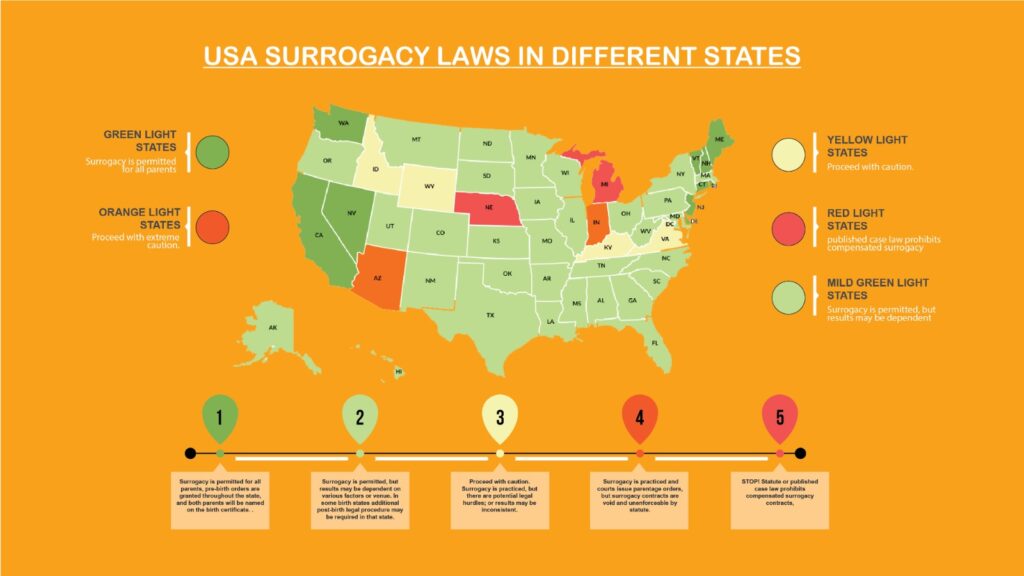Where is Surrogacy Legal Around the World

Exploring International Surrogacy: Where is Surrogacy Legal Around the World?
Where is Surrogacy Legal Around the World is a key question for intended parents exploring this path to parenthood. Surrogacy laws vary significantly across different countries, with some nations fully supporting the process while others impose strict regulations or outright bans. Understanding the legal status of surrogacy in different countries is crucial for a smooth and secure journey.
- Book an online appointment: Get a free online consultation.
- Call\W:+91-8800481100 Email:neelam@ivfconceptions.com
Countries like the USA, Ukraine, Georgia, and Colombia offer surrogacy-friendly legal frameworks, while other regions have restrictions or prohibit it altogether. Intended parents must carefully research international surrogacy laws, parental rights in surrogacy, and legal requirements for surrogacy abroad before choosing the best destination for their journey.
Additional guide for intended parents for cheap surrogacy countries.
Best surrogacy agency in India
Best surrogacy agency in Mexico
Best surrogacy agency in Colombia
Best surrogacy agency in Argentina
Best surrogacy agency in Georgia
Best surrogacy agency in the USA
Best surrogacy agency in Ukraine
Best surrogacy agency in Armenia
Understanding the legal landscape of surrogacy
Before exploring the countries and states where surrogacy is legal, it’s essential to understand the different types of surrogacy arrangements and their legal implications. Surrogacy is generally classified into altruistic surrogacy and commercial surrogacy, each with distinct regulations worldwide.
Altruistic surrogacy occurs when a surrogate carries a child for the intended parents without receiving financial compensation beyond medical and pregnancy-related expenses. This type of surrogacy is often pursued by individuals using a friend or family member as a surrogate. Countries such as the United Kingdom, Canada, Australia, and certain U.S. states with surrogacy-friendly laws allow this form of arrangement under strict legal guidelines.
On the other hand, commercial surrogacy involves a surrogate who receives financial compensation for carrying a child for the intended parents. The legality of commercial surrogacy varies significantly around the world. Some countries, such as Ukraine, Russia, and Georgia, have lenient laws that allow commercial surrogacy, while others, like France and Germany, prohibit it outright.

Countries where surrogacy is legal
Now let’s explore the countries where surrogacy is legal. It’s important to note that the laws and regulations surrounding surrogacy can change over time, so it’s always advisable to seek up-to-date information from reputable sources.
Information on international surrogacy laws organized in a table format:
| Country | Eligibility for Surrogacy | Types of Surrogacy Allowed | Legal Protection for Intended Parents | Accessibility for Foreigners | Advertising for Surrogates |
| Australia | Altruistic surrogacy only | No donor or surrogate matching | Not applicable | Not applicable | Not legal |
| Canada | Altruistic surrogacy only | Not applicable | Not applicable | Altruistic surrogacy allowed | Not applicable |
| Greece | Heterosexual couples, single females | Not applicable | Not applicable | Foreign nationals allowed | Not applicable |
| Georgia | Heterosexual couples (including foreigners) | Compensated surrogacy | Well protected | Foreigners allowed | Not applicable |
| Ukraine | Heterosexual couples (including foreigners) | Compensated surrogacy | Well protected | Foreigners allowed | Not applicable |
| India | Indian citizens only | Commercial surrogacy allowed | Not applicable | Not applicable | Not applicable |
| Israel | Heterosexual Israeli citizens | Altruistic surrogacy only | Not applicable | Not applicable | Not applicable |
| Kenya | Locals and foreigners | Compensated surrogacy | Not legally protected | Not applicable | Not applicable |
| Laos | Foreigners only | Compensated surrogacy | Not legally protected | Foreigners allowed | Not applicable |
| Nigeria | Heterosexual Nigerian citizens | Altruistic and commercial surrogacy | Not applicable | Not applicable | Not applicable |
| South Africa | Heterosexual South African residents | Altruistic surrogacy | Not applicable | Not applicable | Not applicable |
| Thailand | Heterosexual Thai couples | Altruistic surrogacy only | Not applicable | Not applicable | Not applicable |
| UK | Not applicable | Altruistic surrogacy only | Not applicable | Foreigners cannot access | Not legal |
| USA | Gay and heterosexual foreigners | All forms of surrogacy | Well regulated | Foreigners allowed | Not applicable |
As of 2022, the following countries are known to permit surrogacy:
- United States: Surrogacy laws in the United States vary from state to state. California, Illinois, and Nevada are some of the states where surrogacy is widely practiced and legally protected.
- Canada: Altruistic surrogacy is legal in Canada, but commercial surrogacy is prohibited.
- Ukraine: Ukraine has become a popular destination for international surrogacy due to its favorable legal framework for commercial surrogacy.
- Georgia: Similar to Ukraine and Russia, Georgia permits commercial surrogacy and has become a sought-after destination for intended parents.
- Greece: Greece recently legalized surrogacy and offers a regulated framework for both altruistic and commercial surrogacy.
- India: Although commercial surrogacy was banned in India in 2015, altruistic surrogacy is still permitted under certain conditions as per the Surrogacy Regulation Act 2021.
- Surrogacy in Mexico: As per the Supreme Court order in 2021, legal surrogacy is allowed for all family types in Mexico.
- Surrogacy in Colombia: For single men and gay men or gay couples, surrogacy in Colombia is turning out to be an affordable yet legally secure option.
- Surrogacy in Argentina: For single men and gay men or gay couples, surrogacy in Colombia is turning out to be an affordable yet legally secure option.
These are just a few examples of countries where surrogacy is legal. Other countries, such as Mexico, Colombia, and some European nations, have specific regulations regarding surrogacy.
Surrogacy Regulation Overview
Laws regarding surrogacy – both traditional with the carrier’s egg or gestational via embryo transfer – vary extensively worldwide ranging from permissive to prohibited.
- Liberal countries: U.S., Ukraine, Georgia, Mexico
- Neutral countries: Canada, the U.K.,
- Restrictive countries: Australia, China, France
- Banned countries: Germany, Italy, Saudi Arabia
Why such drastic differences? Legislatures grapple with complex questions around commodifying life, women’s health protections, and children’s rights. Regional ethics and values also play major roles in dictating comfort levels with surrogacy.

States where surrogacy is legal in the United States
In the United States, surrogacy laws vary at the state level, leading to a patchwork of regulations. Here are some states where surrogacy is legal:
- California: California has one of the most favorable legal environments for surrogacy. It allows both traditional and gestational surrogacy, and intended parents have legal rights from the beginning of the process.
- Illinois: Surrogacy is legal and well-regulated in Illinois. The state provides legal protections for intended parents, making it a popular destination for surrogacy.
- Nevada: Nevada is another state that has comprehensive surrogacy laws in place. It allows both traditional and gestational surrogacy arrangements.
- Massachusetts: Surrogacy is legal in Massachusetts, but the state requires a pre-birth order to establish the legal rights of the intended parents.
- New Hampshire: New Hampshire permits surrogacy, but it requires a court process to establish parental rights.
These are just a few examples of states where surrogacy is legal in the United States. Intended parents need to consult with an experienced attorney familiar with the specific laws in their chosen state.
Affordable Commercial Surrogacy: Where is it legal?
Commercial surrogacy, where the surrogate receives financial compensation, is a contentious issue in many countries. While some nations have embraced commercial surrogacy and have well-established industries, others have banned it altogether.
Countries where commercial surrogacy is legal include Ukraine, Russia, Georgia, Greece, and India (under certain conditions). These countries have created legal frameworks to regulate commercial surrogacy and protect the rights of all parties involved.
On the other hand, countries such as France, Germany, and Australia have banned commercial surrogacy due to concerns about exploitation and the commodification of human life. These countries only permit altruistic surrogacy, where the surrogate does not receive any financial compensation beyond reimbursement for medical expenses.
Recent changes in surrogacy laws around the world (2024)
Surrogacy laws are not static and can change over time. Intended parents need to stay informed about the latest developments in surrogacy legislation. As of 2022, several countries have made significant changes to their surrogacy laws:
- Greece: Greece recently legalized surrogacy and introduced a well-regulated framework to protect the rights of all parties involved.
- Portugal: Portugal passed a law in 2021 that allows altruistic surrogacy under strict conditions.
- New Zealand: New Zealand updated its surrogacy laws in 2020, making it easier for intended parents to pursue surrogacy arrangements.
- Israel: Israel recently passed a law allowing same-sex couples and single individuals to pursue surrogacy.
These are just a few examples of the recent changes in surrogacy laws. It’s essential for intended parents to stay updated on the legal landscape to make informed decisions about their surrogacy journey.
Surrogacy laws in Europe
Surrogacy laws in Europe vary significantly from country to country, reflecting the region’s diversity of cultural, social, and legal perspectives. While some European countries have embraced surrogacy and provide a legal framework for it, others have strict regulations or outright bans.
Countries where surrogacy is legal in Europe include Ukraine, Russia, Georgia, Greece, and the United Kingdom. These countries have established legal frameworks to regulate surrogacy and protect the rights of all parties involved.
On the other hand, countries such as France, Germany, Italy, and Spain have banned surrogacy or only permitted altruistic surrogacy. These countries have concerns about the ethical and legal implications of commercial surrogacy.
Challenges and controversies surrounding surrogacy laws
Surrogacy laws continue to spark debates and controversies around the world. Some of the key challenges and controversies surrounding surrogacy laws include:
- Exploitation of surrogates: Critics argue that commercial surrogacy can exploit vulnerable women, particularly in countries with lax regulations.
- Child welfare: Surrogacy raises questions about the welfare of the child and the potential emotional and psychological impacts of being born through surrogacy.
- Legal uncertainties: The legal complexities surrounding surrogacy, especially in cross-border arrangements, can create uncertainties and challenges for intended parents.
- Ethical concerns: Surrogacy raises ethical questions about the commodification of human life and the potential for the exploitation of women’s bodies.
Intended parents need to be aware of these challenges and controversies when considering international surrogacy.

Tips for navigating international surrogacy
Navigating international surrogacy can be a complex and daunting process. Here are some tips to help intended parents navigate the legal landscape:
- Research and consult reputable sources: Stay informed about the latest surrogacy laws and regulations in your chosen country or state. Consult with reputable surrogacy agencies and legal professionals who specialize in international surrogacy.
- Understand the legal framework: Familiarize yourself with the specific legal framework surrounding surrogacy in your chosen country or state. Understand the rights and responsibilities of all parties involved, including the surrogate, intended parents, and the child.
- Seek professional guidance: Work with experienced surrogacy consultants and attorneys who can guide you through the entire surrogacy process and ensure compliance with local laws.
- Consider the cultural and social context: Take into account the cultural and social norms of the country or state where you plan to pursue surrogacy. These factors can greatly impact the overall experience and legal implications of surrogacy. Finding a low-cost surrogate mother abroad is easy but you need to consider the legal and social stigma around the surrogacy process there.
Questions to Explore Around Surrogacy Legalities
As laws continuously evolve, asking the right questions allows smart decisions.
- What legal uncertainties could we encounter locally vs. overseas?
- How exactly does the citizenship/visa/birth certificate process work in each country?
- Does our state uphold or contest foreign commercial surrogacy contracts?
- What adoption or court procedures affirm parentage back home after international birth?
While complex, finding affordable surrogacy paths grows increasingly possible as more destinations recognize intended parents’ needs. Seeking specialized legal guidance, evaluating risk factors, and selecting only reputable clinics sets up success abroad.
More Resources to Read:
Surrogacy Guide for Surrogate Mothers
Surrogacy Guide for Intended Parents
How does the surrogacy process work
Conclusion
International surrogacy is a complex and evolving landscape with varying legalities around the world. Understanding where surrogacy is legal and the different legal frameworks is crucial for intended parents. By staying informed, seeking professional guidance, and considering the challenges and controversies surrounding surrogacy, intended parents can navigate the process more confidently.
If you’d like to learn more about IVF, Egg Donation, or surrogacy services globally, check out the rest of our website at Complete Surrogacy Agency. We offer legally secure and affordable surrogacy consulting services for FREE.
For more resources on IVF and Surrogacy, browse our other web page- IVF Conceptions.
For more resources on IVF and Surrogacy, browse our other web page- Georgia Surrogacy Agency.
Complete Surrogacy: Your Trusted Partner in International Surrogacy
At Complete Surrogacy, we have over 15 years of experience in international surrogacy, guiding 4,000+ intended parents worldwide. We provide safe, ethical, and affordable surrogacy solutions for single parents, LGBTQ+ couples, and heterosexual couples.
As members of EFS and ESHRE, we adhere to the highest ethical and professional standards. Our expert team is committed to providing accurate, compassionate, and transparent guidance, ensuring a legally secure and smooth journey to parenthood.
Let us help you build your family with trust, care, and integrity.
Get in touch for one FREE Surrogacy Consultancy!
Our team includes experts from diverse backgrounds with leading reproductive attorneys, professionally trained top fertility doctors, former surrogacy case managers, experienced and kind surrogate mother and egg donor coordinators, mental health professionals specializing in infertility counseling, and a logistic support team to assist you in your chosen surrogacy country.
FAQs on Exploring International Surrogacy: Where is Surrogacy Legal Around the World? (2025)
- Which countries allow international surrogacy in 2025?
When considering where is surrogacy legal around the world in 2025, the top destinations for legal international surrogacy include Georgia, Ukraine, Mexico, Colombia, Argentina, and the USA. These countries have clear surrogacy laws that protect the rights of both intended parents and surrogate mothers.
- Which countries have the most favorable surrogacy laws?
The best countries for legal surrogacy in 2025 are those with established legal frameworks, such as:- Georgia: Open to heterosexual married couples, with full parental rights
- Ukraine: Allows heterosexual married couples, ensuring legal parental recognition
- Mexico: Varies by state, but options exist for international intended parents
- Colombia & Argentina: Offer affordable and flexible surrogacy laws
- Which countries have banned or restricted surrogacy?
Some countries have strict surrogacy laws or outright bans. For example, France, Germany, Spain, and China prohibit commercial surrogacy, and India & Thailand have restricted international surrogacy to protect local surrogate mothers. - Is surrogacy legal for same-sex couples and single parents?
If you’re looking for LGBTQ+ and single-parent-friendly surrogacy countries, options include Colombia, Argentina, and select U.S. states. Some countries, like Georgia and Ukraine, only allow surrogacy for heterosexual married couples. - How do surrogacy laws differ by country?
The international surrogacy laws and regulations by country vary based on:- Parental rights (automatic or court-issued)
- Surrogate mother compensation (altruistic vs. commercial)
- Residency requirements for intended parents
- LGBTQ+ and single-parent surrogacy regulations
- What are the legal risks of international surrogacy?
Choosing safe and legal surrogacy destinations worldwide is crucial to avoid issues such as:- Lack of parental recognition in home countries
- Potential legal disputes over custody rights
- Countries changing their surrogacy laws unexpectedly
- How can I ensure a smooth legal process for international surrogacy?
- Work with reputable surrogacy agencies and clinics
- Consult an international surrogacy lawyer
- Ensure the country provides legal parental rights before birth
- Check if your home country recognizes international surrogacy agreements
References used:

Author Bio: Neelam Chhagani is an International Surrogacy Expert with 15 years of experience in the fertility and surrogacy domain. As the founder of IVF Conceptions and Complete Surrogacy, she has guided over 4,000 intended parents worldwide on their surrogacy journey to parenthood. Recognized as a trusted authority, she specializes in holistic infertility solutions and third-party reproduction consulting.
Holding an MA in Counselling Psychology and a PGD in Mental Health, Neelam is a proud member of the European Fertility Society (EFS) and the European Society of Human Reproduction and Embryology (ESHRE). She is also a leading surrogacy blogger, providing valuable insights into ethical and practical surrogacy solutions.
Since 2010, committed to supporting ALL family types, Neelam has been passionate about helping intended parents grow their families with compassion, integrity, and a focus on secure and affordable surrogacy options Globally.
Learn more about Neelam:
https://www.ivfconceptions.com/neelam-chhagani-surrogacy-consultant/
https://www.linkedin.com/in/neelam-chhagani-92892229/















I was introduced to Neelam by a friend who worked with Neelam for surrogacy. Neelam is absolutely wonderful. I am a single male and the journey to fatherhood is not that easy. Neelam connected me to a program ideal for my circumstances. She was with me throughout the pregnancy providing advice and guidance along the way. I am so grateful I found her and am thrilled today that I have a beautiful daughter. I highly recommend Neelam to anyone who is on a journey to become a parent. Having a child has changed my world for the better. I wish others success with their own journey and recommend you connect with Neelam to find a path that is best for you.
SA (USA)